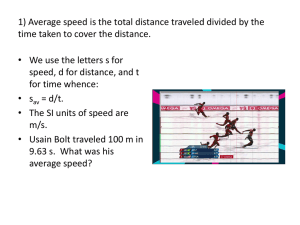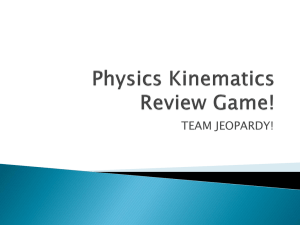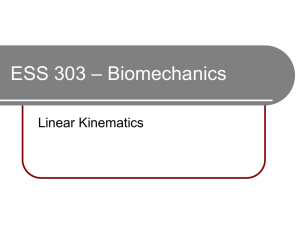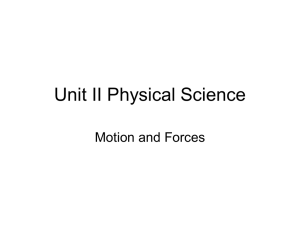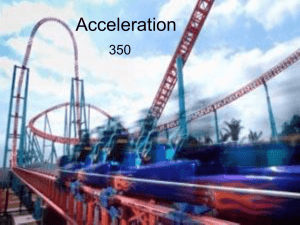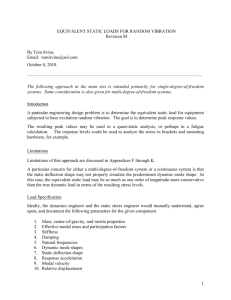Slide 1
advertisement
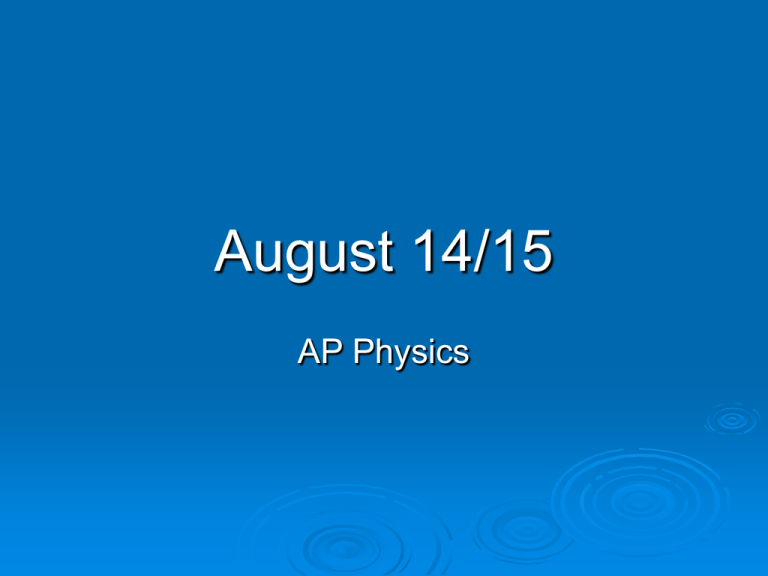
August 14/15 AP Physics Homework check 8a) 23 min b) 64 mi In: For an object that travels 20 km north and then15 km south, what is the ratio of the distance traveled to the displacement? a) 0 b) 1/7 c) 1 d) 7 e) 35 Objective: To finish work on the Graph matching lab To begin an understanding of acceleration Lab: Graph Matching Finish lab Conclusion Restate the problem: Procedure: We found out…. Explain the results: We did this by….. Results: We were trying to find out…… This is because…. Next steps: Next time I would like to try….. Kinematics Equations Displacement: Δd = d2-d1 Velocity V= Δd = (d2-d1) t t Acceleration A = ΔV = (V2-V1) t t Constant Acceleration Equations Problem 1 Average acceleration A shuttle bus comes to a sudden stop to avoid hitting a dog. It accelerates uniformly at -4.1 m/s2 as it slows from 9.0 m/s to 0.0 m/s. Find the time interval of acceleration for the bus. Problem 2 Average acceleration A treadmill has an average acceleration of 4.7 x 10-3 m/s2. a) How much does its speed change after 5.0 min? b) If the treadmill’s initial speed is 1.7 m/s, what will its final speed be? Problem 3 Displacement with constant acceleration: A driver in a car traveling at a speed of 21.8 m/s sees a cat 101 m away on the road. How long will it take for the car to accelerate uniformly to a stop in exactly 99 m? Problem 4 Displacement with constant acceleration When Maggie applies the brakes of her car, the car slows uniformly from 15.0 m/s to 0.0 m/s in 2.50 sec. How many meters before a stop sign must she apply her brakes in order to stop at the sign? Problem 5 Velocity and displacement with constant acceleration A car with an initial speed of 6.5 m/s accelerates at a uniform rate of 0.92 m/s2 for 3.6 s. Find the final speed and the displacement of the car during this time. Problem 6 Final velocity after any displacement A car traveling initially at =7.0 m/s accelerates uniformly at the rate of =0.80 m/s2 for a distance of 245 m. a) b) c) What is its velocity a the end of the acceleration? What is its velocity after it accelerates for 125 m? What is its velocity after it accelerates for 67 m? Problem 7 Final velocity after any displacement An aircraft has a liftoff speed of 33 m/s. What minimum constant acceleration does this require if the aircraft is to be airborne after a take-off run of 240 m? Out: Which of the following is/are true? I. If an object’s acceleration is constant, then it must move in a straight line II. If an object’s acceleration is zero, then its speed must remain constant. III. If an object’s speed remains constant, then its acceleration must be zero. a) b) c) d) e) I and II only I and III only II only III only II and III only

